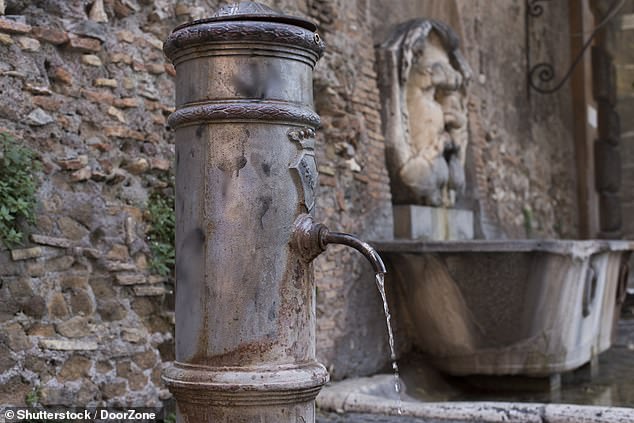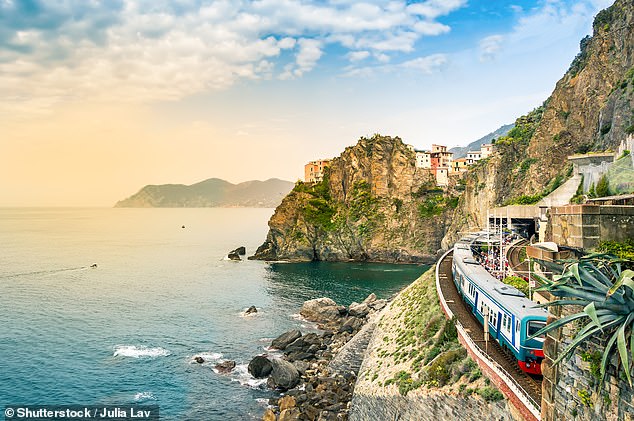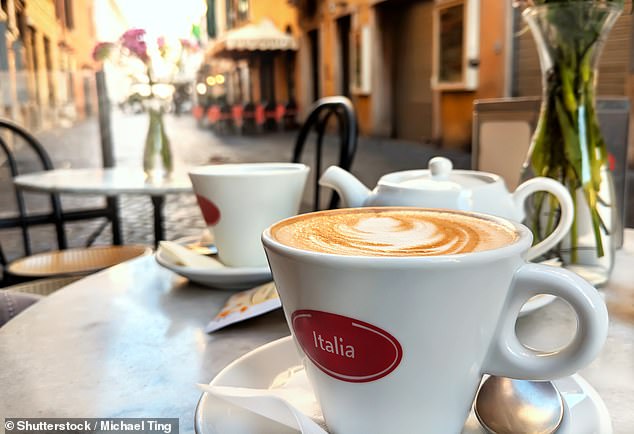Expert on Italy reveals what it’s REALLY like to live there, from cars not stopping at pedestrian crossings to Italians shouting even when they’re not arguing (and how no one orders cappuccinos after dinner)
Are you thinking of living in Italy with one of the recently launched digital nomad visas?
You won’t be a tourist, so you’ll have to get to know the Italian way of life and blend in like a local.
To make the learning curve gentler, Laura Bruzzaniti, an Italian language and culture consultant at the language learning platform, has been working PhDhas compiled a list of things foreigners need to know about Italy before diving into la dolce vita.
From Italians’ habit of shouting a lot to kissing customs, and from when not to order a cappuccino to the dangers of pedestrian crossings, Laura’s list is both useful and eye-opening.
Not every Italian speaks English
Laura Bruzzaniti has put together a list of things foreigners should know about Italy. She is an Italian language and culture advisor at the language learning platform Promova
“Italians start studying English in kindergarten and continue through high school,” says Laura. ‘Yet not all locals, as in every country, speak good English. So if you don’t speak at least some Italian, you may have difficulty making yourself understood. Before you go, it might be a good idea to learn some Italian. Start with the basics, so that you can be autonomous in everyday life and move forward.’
You can work comfortably
Laura says: ‘In Italy you will find many co-working spaces where you can rent a desk from €25 per day. And it is cheaper if you rent for a week or a month. Of course we are talking about big cities. Another option is to use your phone as a hotspot. On an Italian SIM card you can get up to 180G per month for €9.99 (£8.53/$10.66). Not bad.’
Cashless payments are not a thing everywhere
Laura says: ‘Yes, in Italy you can still find small shops that do not accept card payments. Or they will tell you that “the device is not working today”. Make sure you always have some cash with you, just in case.”
You can find great Italian cuisine almost everywhere

Italian hosts can be quite persistent when offering food to their guests, says Laura
Laura says: ‘Italians are very proud of their culinary traditions. Hosts can be quite insistent when offering food to their guests. This emphasis stems from the desire to ensure guests feel welcome and well cared for. If you turn down a dish, don’t be surprised if your host offers it again or encourages you to try just a little bit. This persistence is part of Italian dining etiquette.”
A 30-year-old man may still live with his parents
‘Finding a job in Italy is not easy. Salaries are low and rents in the big cities are high,” Laura reveals. ‘So yes, you can meet people in their twenties and thirties who still live with their parents. Sometimes it’s the only option.’
You get kissed on the cheeks all the time
‘A handshake and two kisses on the cheek. This is the usual greeting in Italy,” says Laura. “Sometimes, even the first time they meet you, people kiss you on the cheek. To be honest, it’s not a real kiss, just a cheek-to-cheek approach without the lips actually touching the cheek.”
There is a usual time to get a glass of something
Laura reveals: ‘In Italy, a night out with friends often starts with ‘aperitivo’, usually between 6pm and 9pm. It is a pre-dinner social gathering where friends meet at bars or cafes to enjoy drinks and light snacks. Aperitivo menus often include appetizers such as bruschetta, olives, cheese and cold cuts such as ‘prosciutto’, accompanied by spritz or Prosecco.’
Be prepared that some Italians can be loud, but that doesn’t mean they argue
Laura reveals, “Southerners – from Rome down – can be quite vocal. And of course they will move their hands a lot while talking. If you don’t speak Italian, a conversation between two Romans might seem like an argument because of the loud tones and frantic gestures. Do not worry; 99 percent of the time it’s just a normal conversation between friends.”
You don’t have to buy water

There are more than 2,500 drinking water fountains in Rome (above)
“You can take a reusable water bottle with you if you live in Italy because you can probably fill it up anywhere,” Laura reveals. ‘In most places in the country there are public fountains on the streets where residents regularly get drinking water. Rome is most famous for this. Thanks to the city’s ancient aqueduct system, there are more than 2,500 fountains. You can safely drink water from all of them. There are even special mobile apps that show you the location of the nearest nason [drinking fountain].’
Impossibility to rent an apartment without an employment contract
Laura explains: ‘If you are considering renting an apartment for a few months, you need an employment contract. If you are a freelancer and don’t have a contract, renting can be difficult. You may find landlords willing to turn a blind eye if you pay “in nero” (under the table) and accept to rent without a regular rental contract. But these are illegal situations that do not guarantee your protection.’
Public transport is often delayed

Traffic in major Italian cities is heavy, especially early in the morning and around 7 p.m., and public transport does not always keep to the timetable
“Patience is a virtue that you will often need in Italy,” Laura notes. ‘Especially when you’re waiting for the bus or the metro. Traffic in the big cities is busy, especially early in the morning and around 7 p.m., and public transport does not always keep to the timetable. Make sure you always have a book with you, just in case. Or just scroll further.’
You do not have to leave a tip in the restaurants
Are there pedestrian crossings in Rome and Naples? Naturally. Do they have the same meaning as in other cities in Italy and the world? Naturally. Do drivers stop at zebra crossings to allow pedestrians to cross? No.
“On a restaurant bill in Italy, there might be an entry called ‘coperto,’” Laura explains. ‘Coperto is a table service charge added to the food and drink costs. It covers the costs of bread, table setting and general service. However, that does not mean that tips are not welcome and that coperto replaces them. It is not mandatory like in the US. But it’s nice to leave a tip, and most people do. It could be as little as 10 percent, and that’s fine. You can also decide not to tip, but most people would.”
Vague meeting times – ‘see you at 8, 8.30’
“Yes, meeting times can be very vague in Italy,” Laura points out. ‘Italians (in the south) are quite relaxed when it comes to schedules. Arriving 10 to 15 minutes late for an appointment is fine.’
Cars don’t stop at zebra crossings
‘Are there pedestrian crossings in Rome and Naples? Of course,” says Laura. ‘Do they have the same meaning as in other cities in Italy and the world? Naturally. Do drivers stop at zebra crossings to allow pedestrians to cross? No. If you stand there waiting for cars to stop, you might have to wait a long time. With a little initiative and a lot of caution, you will eventually get to the other side of the road.”
Ice cream all year round
“Gelato is healthier than regular ice cream,” notes Laura. ‘Gelaterias make it daily with fresh, all-natural ingredients and it contains 70 percent less fat – and therefore far fewer calories – than factory ice cream. There is also much less air in gelato, which makes the taste more intense. Maybe that’s why Italians are so slim.’
No early dinner at 6:30 pm
‘Making friends in Italy is easy,’ says Laura, ‘and the people are generally very friendly. If you are invited to dinner, please do not arrive at 6:30 PM. In Northern Italy, dinner is around half past six. But in the rest of Italy, people sit down for dinner around 8:30 p.m. Or even later.’
No cappuccino after dinner

Cappuccino is something that Italians only drink for breakfast – or in the afternoon when it is cold
“Italians find it very funny to see foreigners having a cappuccino after a meal,” Laura notes. ‘Cappuccino is something that Italians only drink for breakfast or ‘merenda’ (afternoon snack) when it is cold outside. If you want to mingle, order coffee at the end of your meal. Try all the different coffees you can get in Italy: macchiato, schiumato, al vetro, con panna. Or even ‘corretto’ with a little grappa.’
Free wine
‘A free wine fountain sounds like a dream, but it is very real in Caldari di Ortona in Italy,’ says Laura. ‘The small town has a free wine fountain that flows 24 hours a day with locally grown red wine. The fontana di vino can be found in the Dora Sarchese vineyard, located on the Italian pilgrimage route Cammino di San Tommaso.’
